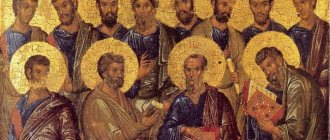Humility is a gift from heaven
Elder Paisius the Svyatogorets writes about humility: “God resists the proud, but gives grace to the humble. Therefore, “humble” means “having grace.”
Humility comes from the word “peace.” This is the acquisition of peace in the soul. This is a gift that comes from heaven. Humility is not a spiritual virtue, not a physical one, but a spiritual one. It is not even inherent in man - by nature, by flesh, by soul - by natural nature. Humility is a supernatural nature, something that Adam lacked. The founder of the opposite passion - pride - is the devil.
Elder Paisius the Svyatogorets writes about humility very simply: “Doesn’t the Gospel say: “God resists the proud, but gives grace to the humble” (James 4:6)? That's how God determined it. “Humble” means “having grace”!” If there is grace on a person, it means he is humble. But there is no grace, and he may have many other virtues - and he can no longer be humble.
Archimandrite Kirill (Pavlov)
Saint James of Nisibius in his “Sermon on Humility” writes: “The humble is kind in everything; his words are sweet, gaiety is written on his face. He finds joy in everything. The humble are adorned by love; for they know how to walk in its light. The meek and humble preserve themselves from all evil, and the goodness of their heart is reflected in their bright face. Do they talk? all their words are decent. Are they laughing? their laughter is not heard. The humble person is afraid to despise others, for contempt is a product of hatred. If he hears slander, he closes his ears so that such words do not enter his heart. The humble person places himself lower than others, but his heart dwells in the highest, and his thoughts rush where his treasures are stored. He looks at the ground, but the gaze of his mind is fixed straight ahead on the beauty of the sky.”
Saint Ignatius (Brianchaninov) writes: “The humble is incapable of having malice and hatred: he has no enemies. If one of the people offends him, he sees in this person an instrument of justice, or the Providence of God. The humble surrenders himself entirely to the will of God. The humble does not live by his own life, but by God. The humble person is free from arrogance, and therefore he constantly seeks God’s help and constantly remains in prayer.”
A humble person does not make excuses if slander is brought against him. The ancient Patericon tells about the Monk Macarius the Great that he was once slandered that a certain girl was supposed to give birth to him. The Monk Macarius the Great did not make excuses, but said to himself: “Makarius! So you found yourself a wife: you need to work more to feed her. And I worked night and day - and sent it to her. When the time came to give birth, she remained in pain for many days and did not give birth. They say to her: what does this mean? She answered: I know, I slandered the hermit and falsely accused him. <...> The servant, coming to me, rejoiced and said: the girl could not give birth until she confessed, saying: it was not the monk who had the matter, but she lied about him. And now the whole village wants to come here and repent before you. When I heard about this, so as not to be bothered by people, I got up and ran away to the Skete.”
You can read about how a humble person thinks in the diary of the murdered hieromonk Vasily (Roslyakova; 1960–1993) from Optina Pustyn: “You see that everything around you is more worthy of you, more honest, more righteous, humble, purer. And it is joyful that they do not despise you, the last, wretched one, do not disdain communication with you, but talk to you as with an equal, sit next to you at the table, go to church with you and never deed or word , do not allow themselves to point out your unworthiness and uncleanness with a glance. But they tolerate you next to them, cover up shortcomings, mistakes, sins, show mercy and sometimes even ask you to perform some kind of obedience, thereby showing special honor, paying attention and elevating the servant and sometimes even a friend to the dignity.
Lord, they forgive me my bestiality and turn to me with a request! Isn’t this joy, isn’t this paradise?.. But all these are only thoughts of humility, and humility itself does not live in my damned heart.”
Venerable Ambrose of Optina
And here is how Elder Archimandrite Kirill (Pavlov) defined humility: “Humility is such a state of the soul in which, having recognized all its weakness and impurity, it is far from any high opinion of itself, constantly trying to reveal the good in itself, to eradicate all the evil, but he never considers himself to have achieved perfection and expects it from the Grace of God, and not from his own efforts.” Father Kirill, of course, is a living humility. No one saw him angry or annoyed with anyone. The elder revealed the living fulfillment of the Gospel. It was enough to see Father Kirill to return to spiritual normality.
I observed several times that as soon as there was a condemnation of one of the priests or a discussion of the shortcomings that happen in the Church, Father Kirill immediately left. They stood in a circle, talking, but as soon as they touched on this topic, Father Kirill began to rush somewhere, silently walked away, did not make any comments to anyone, did not denounce anyone, and never participated in these discussions.
Venerable Sergius cultivates a vegetable garden
The biblical dictionary of Archimandrite Nicephorus interprets it as follows: “Humility is a state of a person’s spirit in which he does not think highly of himself and relies entirely on the mercy of God.” Ushakov’s explanatory dictionary: “Awareness of one’s shortcomings, weaknesses, combined with a lack of pride and arrogance.” Ozhegov’s explanatory dictionary: “Lack of pride, willingness to obey someone else’s will.” New edition of the Bible Encyclopedia: “Humility is the opposite virtue of pride, and one of the most important virtues in the Christian life. It consists in the fact that a person does not think highly of himself, nourishes in his heart the spiritual conviction that he has nothing of his own, but only has what God gives, and that he cannot do anything good without God’s help and grace; In this way he counts himself for nothing and resorts to God’s mercy in everything.” In all definitions you can find something in common: humility, subordination, low opinion of yourself.
Saint Ignatius (Brianchaninov) criticizes humility, the display of humility for the sake of people's approval. False humility, he said, stems from vanity.
Elder Paisius the Svyatogorets writes about humility and its fruits: “It is easy for a person to reproach himself, but he has difficulty accepting reproaches from others. <…> When I lived in Sinai, there was a layman named Stratis. If you shouted to him: “Mr. Stratis!” - he answered: “Which gentleman? Sinner, sinner, call Stratis.” Everyone said: “What a humble man!” One day he overslept in the morning and did not get up on time for work. Someone went to wake him up. “Stratis, are you still asleep? We have already read the Six Psalms. Aren't you going to go to the service?" He began to shout: “Yes, I have more piety than you! And are you going to tell me to go to church?” He screamed like crazy... He even grabbed the key to the door - as big as a barn lock - and swung at the man because his pride was hurt. The people who heard him shout were speechless, because everyone considered him humble and took their example from him. Stratis was disgraced. Do you see what's happening? He called himself a sinner, but as soon as his pride was hurt, he simply went wild!”
In order for humility not to be false, one must avoid speaking humbly and try not to stand out among others and hide righteous deeds. One should also not be called upon to perform low deeds, but when commanded to do something, do not contradict, but do it with obedience.
In psychology there is a certain analogue of what in spiritual literature is called false humility. This is complex. Alfred Adler, the founder of the doctrine of the inferiority complex, wrote that a person with a complex strives for dominance over others or withdraws into himself, running away from life's difficulties. Such a person tends to suppress, tries to align the people around him with the template of his own “I”, and is afraid of naturalness and simplicity.
What are the means to acquire humility? St. Anthony the Great writes: in order to achieve humility, you need to pay attention to both the internal and the external. “Be humble in everything: in posture, in clothing, in sitting, in standing, in gait, in the cell and in all its accessories.”
Holy Righteous John of Kronstadt
The first means to achieve humility is to cut off your will. St. John Climacus writes: “Humility is born from obedience, and dispassion is born from humility.” In monasticism, obedience is one of the vows that leads a person to spiritual life.
It is necessary to ask for forgiveness and blame yourself. Venerable Anthony the Great: “Get in the habit of letting your tongue say in all cases, at all times and to every brother: “Forgive me.” In the same way, Abba Dorotheos writes: “First of all, you need humility in order to be ready to say “forgive” to every word.”
He who asks for forgiveness scorches the demons and makes them powerless. Bodily labor in submission and self-reproach cultivates humility. Venerable Anthony the Great: “Love work, submit yourself to everyone, keep your lips closed and you will achieve humility. Humility will attract remission of all your sins.”
Elder Paisiy Svyatogorets
There is a well-known example from the life of St. Sergius of Radonezh, who, as abbot, worked with the brethren in poverty and poverty: “One man was a Christian, a farmer, a peasant plowman, who lived in a village that was far from the monastery, who plowed the land with a plow and with this labor extracted food for himself - having heard a lot about St. Sergius, he was inflamed with the desire to see him. Having completed his work, this peasant came to the monastery. At that time, St. Sergius was digging soil with a shovel in the garden to plant vegetables. Since the peasant had never seen Sergius, he arrived at the monastery and began asking the brethren: “Which of you is Sergius? Where can I find this wonderful and glorious husband about whom they talk so much? How can I see him? They answered him: “The elder, having retired, is digging a garden. Wait a little until he comes out.” The impatient visitor could not wait for the elder to appear and, looking through the gap in the fence, he saw the blessed one in torn, poor clothes sewn with patches, working in the sweat of his brow. The peasant could not even think that it was the one whom he so badly wanted to see, and did not believe that it was the one about whom he had heard so much.”
In many monasteries of Athos, this tradition has taken root: the abbot of the monastery works together with the brethren of the monastery, and sometimes even more than the rest of the brethren. Those who wish to acquire the virtue of humility must avoid teaching. It was said about St. Arseny the Great that “he never wanted to talk about any question from the Holy Scriptures, even though he could if he wanted to. I didn’t even write a letter soon.”
Humility is patience with insults and lies. Everyone who prays to God: “Lord, give me humility,” must know that he is asking God to send an offender to a person.
Works of St. Sergius
In St. Petersburg I had the opportunity to meet several times with one archpriest of a very pious life. And he said that he studied at the academy with the future His Holiness Patriarch Alexy. They lived in the same room. And every day he humbled the future Patriarch. He was several months older than the future Patriarch and, taking advantage of this, he said: you must obey me. But Alexy endured such reproach with humility and did not answer him in any way. But when he became Patriarch, he many times remembered his neighbor with gratitude: they say, there was a man who really taught him humility. And this priest showed me several folders: on every holiday, Patriarch Alexy personally signed a postcard for him with his own hand. Five or six times a year - at Easter, at Christmas, at Trinity - he thanked him all the time for teaching him humility.
The holy elder Paisius the Svyatogorets wrote that sadness is displeasing to God, and humility consists of joy and gratitude to God: “Instead of washing your face with tears of joy and gratitude to God, you water it with tears of sorrow and sorrow. Hence the following conclusion follows: if we do not humble ourselves voluntarily, then we will be forced to humble ourselves, since the Good God loves us.”
Hegumen Cyprian (Yashchenko)
Without God it is impossible to create a single virtue, therefore prayer gives birth to humility, and humility gives birth to prayer. Abba Dorotheos writes: “It is obvious: the humble and reverent, knowing that it is impossible to perform any virtue without the help and protection of God, does not cease to constantly pray to God to show mercy to him. He who constantly prays to God, if he is honored to do something proper, knows through Whom it was done by him, and cannot boast or attribute to his own strength, but attributes to God all his corrections, thanks Him incessantly and prays to Him incessantly, trembling, so as not to lose help from above, so that his own weakness would not be revealed in this way. He prays out of humility.”
Saint Anthony, while praying, heard a voice: “Anthony, you have not yet come to the measure of the shoemaker in Alexandria.” Anthony found the shoemaker and convinced him to reveal what was special about his life. He said: “I don’t know that I have ever done any good. Why, when I get out of bed in the morning, before I sit down to work, I say: “Everyone in this city, young and old, will enter the Kingdom of God for their good deeds, but I alone will be condemned to eternal torment for my sins.” I heartily repeat this same thing with all sincerity in the evening before I go to bed.” Hearing this, Saint Anthony realized that he had certainly not yet reached such an extent.
They say about Elder Joseph the Hesychast that as a child he accepted punishments so obediently that his father lost all desire to punish him: “Little Francis was an obedient and reasonable, but at the same time a very lively child. His father used to get angry with him because of his pranks and sometimes wanted to give his son a good beating. “Let me tell Francis off for what he did!” - said Georgy. When Francis heard this, he quietly and calmly approached his father sitting in the chair to punish him, and bowed his head, showing complete obedience. He did not run away, did not get angry, did not shout - he showed obedience: “Since you want to flog me, then flog me.” And the father, a believer and a kind-hearted man, was captivated by this gesture of his little son and said: “Okay, run away from here! I can’t even flog you because of your humility.”
The Monk Ambrose of Optina spoke about the levels of humility: “Vedati is appropriate, as three are the essence of perfect humility degrees. The first degree is to submit to the elder, and not to exalt yourself above your equals. The second degree is to submit to equals, not to exalt yourself over lesser ones. The third degree is to submit to the lesser and impute to oneself the insignificance of existence.”
Saint Ignatius (Brianchaninov) writes about how humility manifests itself in a person as he takes root in this virtue: “The beginning of humility is poverty of spirit; the middle of success in it is the world of Christ, which surpasses all understanding and comprehension; the end and perfection is the love of Christ.”
The Monk Paisius the Svyatogorets reasons: “I am often asked: “How long does it take to acquire Divine Grace?” Some people can allegedly live spiritually all their lives, struggle, etc., but at the same time think that they represent something - such people do not acquire the Grace of God. And others acquire grace in a short time because they humble themselves. If a person humbles himself, then grace can shine upon him in a minute, make him an Angel, and he will go to heaven. And if he becomes proud, in a minute he will become a tangalashka and end up in hell. Humility opens the doors of Heaven, and the Grace of God comes to a person, but pride closes them. Elder Tikhon said: “One humble person has more grace than many people together. Every morning God blesses the world with one hand, but if he sees a humble person, he blesses him with both hands. He who has the most humility is the greatest!” Everything depends on a humble disposition. When a person has a humble disposition, then it is natural for him to connect earth with Heaven. It amazes me how one humble thought instantly brings into action the Grace of God. Once a kitten wandered into my cell. The poor guy apparently ate something wrong, got poisoned and now asked for help, writhing in pain, jumping like an octopus when he is hit by stones... It was a pity to look at him, but what can you do? I crossed him once, twice, nothing! “Look at you,” I said to myself then, “how many years have you been a monk, but you can’t even help an unfortunate kitten!” As soon as I blamed myself, the kitten, which was already on its last legs, suddenly came to its senses. He ran up, began to rub his legs and jump joyfully... That’s the power of humility!”
Saint James of Nisibius concludes in his “Sermon on Humility”: “Its fruits are desirable; for it produces calmness and modesty, and forms a amiable and serene character. The humble are simple-minded, patient, kind, innocent, sincere, learned, wise, prudent, prudent, peace-loving, merciful, loving, and forgiving; their mind penetrates into the depths of wisdom, their heart enjoys peace, their soul shines with beauty. Blessed is the soul that is grafted into this so fruitful tree; for peace reigns in her, and He lives in her who loves to dwell in the meek and humble.”
Since humility is a property of Christ, then together with humility He Himself indwells the soul of a Christian, or humility will reign only when Christ is depicted in it. That is why humility is impossible without Communion - union with Christ. This is the inner side of this spiritual virtue.
Saint John Climacus believed that the path to humility is obedience and rightness of heart
St. John Climacus believed that it is impossible to have humility without obedience:
John Climacus
Reverend
“The path to humility is obedience and rightness of heart, which naturally resist boasting.”
Saint Tikhon of Zadonsk wrote that humility must be shown not only externally, but also internally. He notes that many people strive to show their humility only outwardly, but do not have it in their hearts at all:
Tikhon Zadonsky
Saint
“...Many renounce the ranks and titles of this world, but do not want to give up a high opinion of themselves, they renounce honor and worldly dignity, but want to be revered because of holiness.
Many are not ashamed to call themselves sinners in front of people, or even more so, the most sinful, but they don’t want to hear this from others and therefore only call themselves such with their lips... Others cover their bodies with a black cassock and mantle, but do not want to cover their hearts.
So they show other signs of humility!.. All of them do not have such humility in their hearts. These signs may be signs of humility, but when what they mean is not there, this is nothing more than hypocrisy.
Such people are like a bottle filled with air, which seems to be filled with something, but when the air comes out, it turns out that it is empty... Therefore, humility, like all piety, must be in the heart.”
Ephraim the Syrian wrote, one must have the signs of a person who truly has humility
Ephraim the Syrian wrote that in order to have the mercy of God you need to have the traits and signs of a person who really has true and correct humility, you need:
Efim Sirin
Saint
“...consider yourself a sinner before God, reproach yourself at every time, in every place and for every deed, not to blaspheme anyone and not to find on earth a person who would be more vile, or more sinful, or more negligent than himself, but to praise and glorify everyone , never condemn anyone, do not humiliate or slander anyone, remain silent at all times and do not say anything unless ordered or absolutely necessary...”
John Chrysostom said that no matter how much a person humbles himself, he will never be able to humble himself as much as Our Lord humbled himself. He also wrote that in order to acquire humility, one should not be afraid of losing one’s honor. If a person has humility, his glory will rise.
John Chrysostom
Saint
“...If we want to seem great, we will not become great, but we will be more dishonest than everyone else...”
Saint Simeon the New Theologian wrote:
Simeon the New Theologian
Saint
“It is one thing to speak humble words and another to have humility. One is humility, the other is the color of humility, and the third is its fruit. One thing is the beauty of the fruit, another is its sweetness, and another is the actions that come from this fruit.
From this, what is said about humility, some things are in our power, and others are not in our power. It is in our power to think about what disposes us to humility, to philosophize about it, to reason, speak and do, but holy humility itself with its essential properties, gifts and actions is not in our power, but is a gift of God, so as not to decide who can boast even of this.”
Conclusion - what a person needs to do to have humility in his soul and heart
Let us summarize everything previously said from the words of the holy fathers. What does a simple person still need to do in order to have humility in his soul and heart?
- you need to try to talk as little as possible, and do more useful and good deeds;
- to accept with gratitude everything that comes our way, and there will be both good and bad, and there will most likely be more bad, but all this must be endured;
- always remain calm, quiet, kind and meek, even if someone is trying to anger you or piss you off;
- you always need to choose the worst place, the hardest and most difficult work;
- let no one love you, but you must love and not demand anything in return from a person;
- we need to understand that everything we have, any talents, abilities, everything was given to us by the Lord, we ourselves cannot give anything to ourselves;
- you need to pray more often, ask God for forgiveness for all your sins.
Of course, it will be very difficult to fulfill all the points; we must try to obtain what is called a Christian virtue - humility.
By leaving a comment, you accept the user agreement











